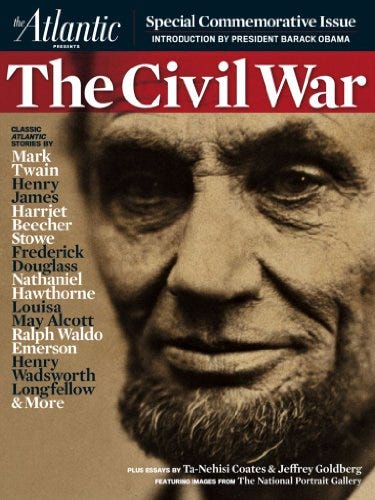I recently reread Ta-Nehisi Coates’s thoughtful essay on his experiences visiting Civil War battlefields like Gettysburg and why so few African Americans study the Civil War. The essay was written ten years ago in 2012 during the Civil War 150th commemorations, before the racial violence in Charleston, Charlottesville, and Minneapolis, which led to the removal of hundreds of Confederate monuments and a broader reckoning with the American past.
The essay raises a number of important points, especially as the pace of monument removals decreases and more and more people begin to consider alternative approaches to how to deal with Confederate iconography, including monuments, that remain in public spaces.
For realists, the true story of the Civil War illuminates the problem of ostensibly sober-minded compromise with powerful, and intractable, evil. For radicals, the wave of white terrorism that followed the war offers lessons on the price of revolutionary change. White Americans finding easy comfort in nonviolence and the radical love of the civil-rights movement must reckon with the unsettling fact that black people in this country achieved the rudiments of their freedom through the killing of whites.
And for black people, there is this—the burden of taking ownership of the Civil War as Our War. During my trips to battlefields, the near-total absence of African American visitors has been striking. Confronted with the realization that the Civil War is the genesis of modern America, in general, and of modern black America, in particular, we cannot just implore the Park Service and the custodians of history to do more outreach—we have to become custodians ourselves.
The Lost Cause was spread, not merely by academics and Hollywood executives, but by the descendants of Confederate soldiers. Now the country’s battlefields are marked with the enduring evidence of their tireless efforts. But we have stories too, ones that do not hinge on erasing other people, or coloring over disrepute. For the Civil War to become Our War, it will not be enough to, yet again, organize opposition to the latest raising of the Confederate flag. The Civil War confers on us the most terrible burden of all—the burden of moving from protest to production, the burden of summoning our own departed hands, so that they, too, may leave a mark.
I can’t help but wonder if Coates still subscribes to this view given everything that has happened over the past few years. Has he moved to a more uncompromising position on monument removals or have the past few years reinforced the conclusions drawn in this piece?
For Coates, the question of the removal or relocation of monuments has little to do with establishing a claim to the past and identification with a specific historic site. Taking back or laying claim to a historic place like Gettysburg will only come through imposing new stories and lessons onto the landscape.
Coates may be speaking for African Americans, but we can apply his thinking much more broadly. Protest can point out injustice and blind spots in our public/collective memory, but only through the “production” of new ways of connecting to and making meaning of the past will we have any chance of summoning and dispelling its ghosts.





"The Civil War confers on us the most terrible burden of all—the burden of moving from protest to production, the burden of summoning our own departed hands, so that they, too, may leave a mark."
Agree. Visiting the National Museum of African American History and Culture, I was struck very hard by the generosity of the donors in parting with family heirlooms to instruct and inform their fellow Americans. In particular, enslaved people had so little to leave to heirs or share with family members, it's particularly kind of their descendnts to donate, especially as these donation make the collection come alive.